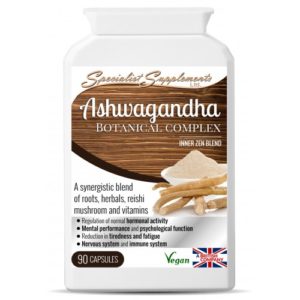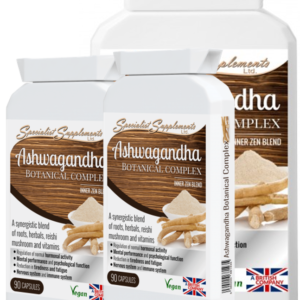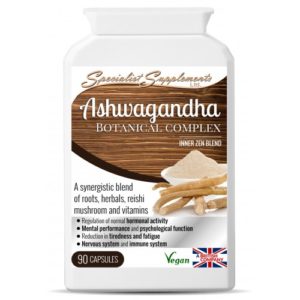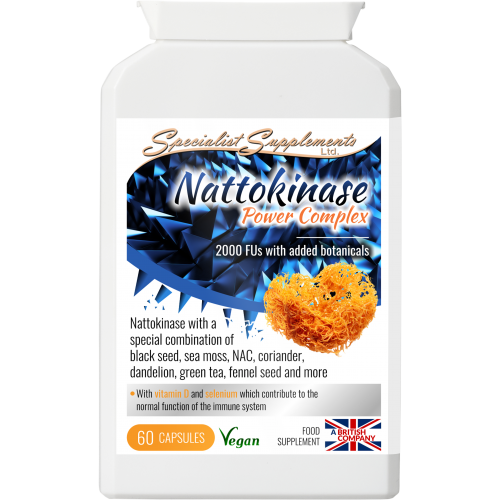5 Benefits of Natural Organic Ashwagandha
 Ashwagandha Health Benefits
Ashwagandha Health Benefits
What are Ashwagandha health benefits?
It’s an ancient medicine that’s still being utilised today – Ashwagandha has been used against a huge number of ailments since its discovery.
In a time of science and huge medical advancements, is there still space for herbs and plant remedies in our health regimes?
What can it help with compared to other supplements?
We’ve done a lot of research and can tell you about the health benefits of Ashwagandha.
As is often the case with some early plant cures, there’s a grain of truth to their healing abilities, the extent of which we’ve noted in this article.
To begin things, though, we must first address an obvious question…
What is Ashwagandha?
Also known as Indian Ginseng or Withania somnifera, Ashwagandha can be found in some of the drier parts of India (naturally).
It can be found further afield though, in areas like Yemen and China. The name is derived from the unique smell of its root: ashva means ‘horse’ in Sanskrit, with gandha meaning ‘smell’.
The story of it becoming a supplement begins thousands of years ago, with one of the oldest medical traditions in the world.
Ashwagandha was first used in Ayurvedic medicine around 3,000 years ago, as the tradition was developing.
Ayurveda is focused on the balance between the mind, body and soul.
Ashwagandha is what’s known as a rasayana: a herb that can help longevity, or keep your mind and body feeling young.
Because of this, tonics made from Ashwagandha were given to the aged, to revitalise them (it was also given to the young, to maintain their youth for longer).
As time went on, Ashwagandha benefits included a range of ailments, like swollen joints, waning sex drive in both sexes and mental stimulation.
With the advent of advanced nutritional knowledge, we now have a better idea of what parts of the body the supplement can be used for.
Interestingly, the Ayurvedic uses for Ashwagandha were not far off the mark, according to modern medicine.
What Is It Used For?
Searching for Ashwagandha’s health benefits can be intimidating, as it leads to an avalanche of symptoms and conditions it can supposedly assist with.
It’s important in situations like this to take the scientific research into account, and plenty has been conducted on Ashwagandha’s effects on the body.
Let’s separate fact from fantasy:
How Ashwagandha Benefits Stress and Anxiety
One of the most commonly cited benefit of Ashwagandha is its ability to deal with stress.
This may originate in its Ayurvedic use as a rejuvenation medicine, and this is one characteristic that translates into the modern world.
This is lucky for many of us: a survey conducted in 2018 stated that 74% of people felt stressed to the point of being unable to cope.
With Ashwagandha being light on side effects too, it might prove to be an alternative to other types of treatment or another tool in your arsenal against stress.
Research conducted in this area yields positive news. With stress releasing certain hormones into the bloodstream, it can be easily tested and measured.
One paper from 2000 found that taking Ashwagandha reduced levels of tribulin – a marker of stress in the brain.
One of the more well-known stress hormones is cortisol, and it’s also affected by Ashwagandha.
One piece of research took 64 participants with a “history of chronic stress” and split them randomly into two groups: one taking high strength Ashwagandha capsules twice a day, the other taking a placebo.
After 60 days they found that the Ashwagandha group “exhibited a significant reduction in scores on all the stress-assessment scales.” This included measurements of cortisol levels, which were “substantially reduced.”
Blood Sugar Levels
This is one characteristic of Ashwagandha that’s less obvious when looking at its history.
It may play a part in its reputation for granting youthfulness, as blood sugar contributes to energy levels in the body.
While it’s not been one of the main focuses of testing of the plant, a few studies have observed Ashwagandha’s effects on sugar alongside other applications in the body.
One study that does focus on Ashwagandha’s blood sugar effects found that it had an effect “comparable to that of an oral hypoglycemic drug.”
It should be noted, however, that this study had a small sample group of about 12 participants, so larger-scale studies would need to be conducted to confirm its abilities for certain.
Saying that, another piece, focused on Ashwagandha’s effects on schizophrenic patients, also found that it reduced blood sugar levels in fasting patients.
This may suggest that it could be useful for diabetic individuals, to keep their blood sugar levels in check if they tend to be on the higher side.
Inflammation
There is some evidence that Ashwagandha health benefits include in this area. You may imagine that it reduces the size of inflammatory spots around the body, but there’s more to inflammation than just those physical build-ups of cells.
As it’s an immune and healing response in the body, many chronic illnesses have an inflammatory response.
This means the likes of asthma, arthritis and other joint pains may be supported by Ashwagandha supplementation.
Observation’s into Ashwagandha health benefits on the immune response regarding inflammation has turned up some interesting results.
One study found that there was an increase in white blood cell and platelets in those taking the supplement, which can help fight infections that cause inflammation.
Another study noted how Ashwagandha health benefits include supressing a protein called α2-macroglobulin, which is frequently seen in anti-inflammatory drugs.
Male Infertility
There’s another kind of ‘revitalisation’ that Ashwagandha can promote.
There’s evidence to show that it supports male fertility in a number of ways. Infertility itself can be a complex condition, brought on by any number of physical or mental causes.
For those who might be caught in-between some of these causes, a supplement that can hit several areas at once makes sense.
One area that there’s been an observed link is between Ashwagandha and assisting oligospermia – low quality or number of sperm in one’s semen. An Indian study took 46 individuals with low sperm counts and observed how an Ashwagandha supplement affected their semen.
After 90 days they found that there was a “167% increase in sperm count… and 57% increase in sperm motility.” Another study tested oligospermia brought on by stress; it found an improvement after taking the supplement for three months (possibly related to its anxiety-fighting abilities).
Another way Ashwagandha helps is by increasing levels of testosterone in the body, assisting with arousal and sex drive.
Both of the studies mentioned above state increases in the hormone, alongside their other conclusions.
It can also aid women who lack in testosterone too, as it’s thought that low levels play a role in lack of female sex drive.
Mental Benefits
There’s been some bold claims about Ashwagandha health benefits including certain mental conditions.
Of course, one needs to be cautious when it comes to statements like this. The phrase “helping with brain function” is a massive generalisation: there are thousands of chemical reactions and processes happening in the brain at any one time.
We need to focus on which of these exactly Ashwagandha can assist with. At current, we believe its powerful antioxidant action could bolster the body against neurodegenerative disease.
With our current understanding of the brain, we believe that oxidative stress – damage to the atoms that make up a cell – play a role in the development of diseases like Alzheimer’s.
It can also affect things like memory and learning, and Ashwagandha may be able to fight against this.
One study found that use of an Ashwagandha supplement helped mice with Parkinson’s disease in “all physiological abnormalities”, including walking and grooming.
There’s also been studies that conclude that reflexes and hand-eye coordination could be sharpened by daily supplementation.
With these studies aside, much of the current research into Ashwagandha’s effects on nerve and brain tissue has only been conducted in vitro – in lab conditions using tissue samples, not human participants.
These tests pave the way to more thorough testing with human participants, so while there’s some optimistic results we’ll only know the true extent of Ashwagandha health benefits effect once research has moved onto the next phase.







